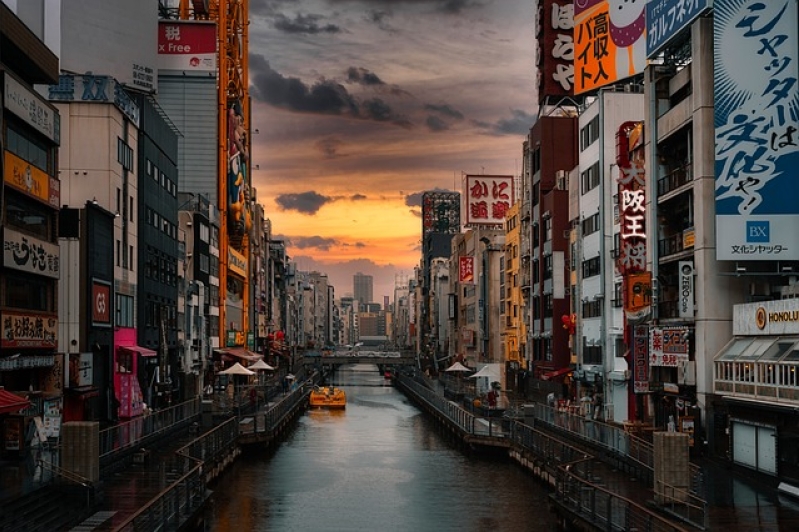
The Gospel Herald interviewed Jiang Dao, a post-80s Chinese evangelist now living in Osaka, Japan, to learn why he left Wenzhou—often considered a “saturated” land of faith—and how he continues to pursue his missionary calling in a spiritually indifferent Japan.
Brother Jiang was born in Wenzhou, Zhejiang Province, and once served as a full-time worker in a local house church. After the COVID-19 pandemic, he left his hometown with his family and settled in Osaka, where he now lives a “tentmaking” lifestyle—working to support himself while sharing the gospel, much like the Apostle Paul.
Wenzhou was once one of the most vibrant centers for China’s house church movement. “The gospel has already become ‘saturated’ in Wenzhou,” Jiang said.
As early as 1866, British missionary George Stott brought the gospel to Wenzhou under the China Inland Mission. He spent 26 years evangelizing in the city. Methodist missionary William Soothill followed in 1882, preaching the gospel, establishing hospitals, and founding schools—laying a solid foundation for the growth of Christianity in Zhejiang.
“From George Stott until now, the gospel has reached every corner of Wenzhou,” said Jiang. Today, Wenzhou is home to fourth-, fifth-, even seventh-generation Christians, and many villages boast two or three churches.
As a third-generation Christian, Jiang holds a cautious view of the recent development of the Wenzhou church. In his opinion, churches in Wenzhou “shouldn’t concentrate all their resources locally.” He noted that too much funding goes into building and decorating church buildings, while the church’s “software”—the training and theological education of pastors—is neglected. “Some church buildings are even more luxurious than government offices, which inevitably makes them politically sensitive.”
“There have been many large churches built, costing tens of millions, even hundreds of millions of yuan,” he observed. “But in terms of software, Wenzhou churches are seriously lagging behind. Many older church leaders are devout and faithful workers, with a desire to ‘build a house for God.’ They see leaving behind a grand church for their children and grandchildren as a legacy,” he said. “But Jesus once said, ‘Not one stone here will be left on another.’ The church is not made of stones—it is the body of Christ.”
Recalling the 2013 crackdown in Zhejiang, when crosses were forcibly removed and even church buildings were demolished, Brother Jiang believes it was a wake-up call for Wenzhou churches to reassess how they allocate their resources.
In addition to internal mismanagement, churches face mounting external pressure. Policies from religious authorities leave churches scrambling to cope. What Jiang finds most difficult to accept is the forced shutdown of all Sunday schools.
Banning minors from learning about Christianity while promoting “red” (communist) education amounts to “Pharaoh’s massacre of the infants,” Jiang said. As China tightens control over religious freedom—especially in faith-dense areas like Wenzhou—house churches have become prime targets of suppression.
That’s part of why he left. “Missions is the Great Commission Jesus gave to every Christian. Without missions, faith loses its power,” he said.
China and Japan share deep cultural roots, but also a painful historical relationship. Jiang noted that while missionaries and church planters from the U.S., Hong Kong, Taiwan, and Singapore are already active in Japan, there are still none from mainland China’s house churches.
He believes this absence is partly due to systemic restrictions—but also due to unresolved nationalistic feelings among Chinese Christians.
“It’s like Jonah not wanting to go to Nineveh,” he said. “There’s still enmity between our peoples.”
Jiang’s journey in Japan has been harder than he imagined. No churches back home were willing to support his mission work in Japan. Faced with reality, he began working to support his family while preaching the gospel on digital platforms, embracing the tentmaker lifestyle.
Wenzhou has been called “China’s Jerusalem,” and Wenzhounese are often dubbed “the Jews of the East”—wherever they go, business follows. Jiang is no exception. His work includes real estate and visa consulting, and he is committed to building a resource network for Chinese communities in Japan. When time allows, he shares gospel messages on platforms like YouTube and X.
On the surface, Japan appears indifferent to religion, but religious activities are everywhere: shrines, Buddhist temples, Shintoism, Tenrikyo—you name it. Jiang has observed that while many Japanese express reverence in ritual ways—such as saying “Itadakimasu” before meals, which resembles a prayer—they lack a true understanding of salvation and biblical truth.
“Japan has too many religions—but no gospel,” he said.
Despite the loneliness of his mission, Jiang remains hopeful for Japan’s spiritual future. “Japan is an ethnically unified nation. If revival comes, the impact could be enormous,” he said. “I’ve always hoped that Japan would experience a great spiritual awakening like Korea did in the past.”
“That would deeply influence not only Asia, but the entire world,” he said.
Originally published by Chinese Gospel Herald.






